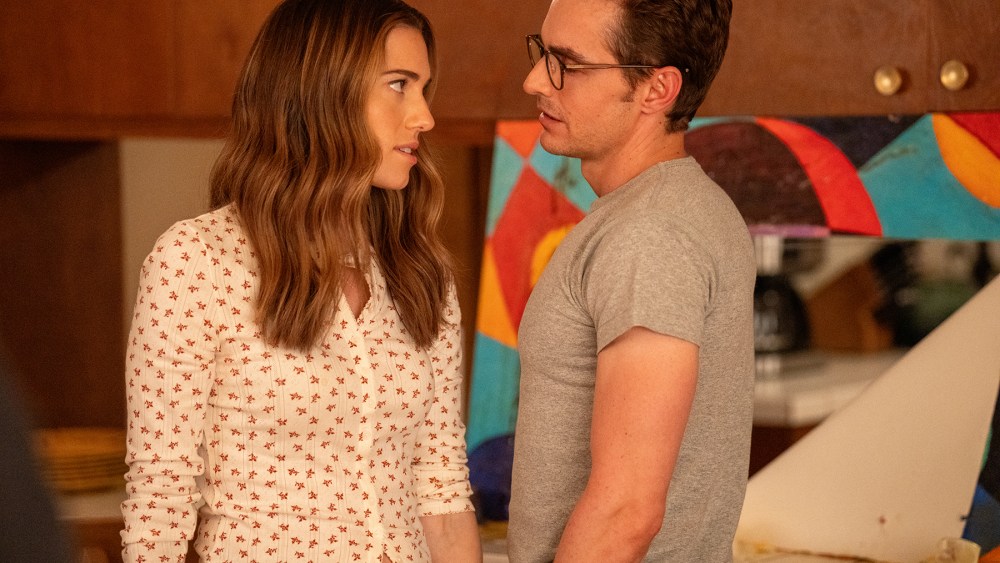
We Regret to Say It’s No ‘It Ends with Us’
What’s the difference between a good soap opera and a bad soap opera? A good soap opera might have histrionic twists that make your jaw drop, though in some weirdly compelling and quasi-plausible fashion. A bad soap opera might also cause your jaw to drop, but in a “WTF just happened? Give me a break!” kind of way.
“It Ends with Us,” the smash 2024 movie based on a Colleen Hoover novel, was ultimately overshadowed by the offscreen World War III that erupted between its star, Blake Lively, and her costar and director, Justin Baldoni. But after all the accusations, the lawsuits, the countersuits, the texts (and Taylor Swift!), the movie remains, in my book, a stellar entry in the genre — one that used soap-opera conventions to lure us inside the emotions and illusions of an abusive domestic relationship. The film’s commercial success was a true achievement, because it earned its hits status the old-fashioned way: by telling a melodramatic story that surprised and moved audiences.
“Regretting You,” on the other hand, is a soap opera-meets-YA romance, also based on a Colleen Hoover novel, that offers the audience some hooks but can’t hide its essential cheesiness. This one, too, is trying to be an A-list affair, with good actors doing their best to class up the proceedings. Yet when the big twists happen, they have a forehead-slapping quality. The film will likely work for a certain audience (notably teenagers who can swoon over the “tempestuous” but really puppy-love romance between two sensitive and adorable high-school seniors). But to the audience that turned out for “It Ends with Us,” “Regretting You” may provoke as much unintentional laughter as it does lumps in the throat. Or maybe the laughs are actually, in some bizarre way, almost a deliberate part of it all. One of the defining elements of soap opera is that it has a certain shameless quality, and Josh Boone, the director of “Regretting You,” and his screenwriter, Susan McMartin, don’t appear to be remotely ashamed of what they’re doing. The film’s ever-so-slightly absurd sincerity is nothing if not brazen.
The opening scene is a nighttime beach-bash flashback, featuring computerized de-aging (which is very odd to see on actors who aren’t that old to begin with), in which it’s established that Morgan (Allison Williams) and Jonah (Dave Franco) are earnest, a touch dorky, and meant for each other. Unfortunately, they’re both in relationships with other people. Morgan is a couple with Chris (Scott Eastwood), a hunk bro who tells her that his favorite version of her is when she’s drunk (charming!). Jonah’s girlfriend is Morgan’s sister, Jenny (Willa Fitzgerald), a party girl in cut-offs who looks like she’d eat him alive. Why can’t the partners just…switch? Because there wouldn’t be a movie. Nevertheless, after the story leaps ahead 17 years, we think: Wow, the four did a very good job of sustaining these mismatched, tone-deaf, totally wrong relationships!
All of them still live in the town of Dylan (population: 38,000), where Morgan and Chris have a warm and bubbly daughter, Clara (Mckenna Grace), who is 16 going on 17, and where Jonah and Jenny have a new baby, even though they aren’t married. (It seems that Jonah abandoned Jenny for years, but then they reconnected at a reunion and slept together once. Such is the stuff from which life destinies are forged.)
The set-up, with its romantic tensions still cross-wired after all these years, seems promising. And when Clara spies her classmate Miller Adams (Mason Thames) along the roadside, and decides to give him a ride, the film introduces a next-generation complication-that-isn’t-really-one. Mason Thames, from the “Black Phone” films and “How to Train Your Dragon,” suggests a WASP Jesse Eisenberg, with pointy features that make him look like he should be playing Tom Sawyer, and he’s a charming actor who keeps the chivalrous vibes front and center. Miller teases Clara in an acerbic way, but he’s a good kid with a rough background (his father was a convict), raised by his Gramps (Clancy Brown), who has cancer. As soon as Miller breaks up with his girlfriend, changes his mind, and then breaks up with her again, he’s ready to commit.
So everyone is more or less happy. Which, of course, will not do.
“Regretting You” is not a winning title for a romantic movie. (Why do we have to read a four-dollar word that seems to say: I made a depressing mistake!) But the film does, of course, need to feed on its quota of dark disaster. And when that happens (spoiler alert: I’m going to reveal some of it), it is, in a certain way, the kitschiest thing in the movie. Here’s what happens: A couple of the characters get killed in a car accident. And here’s why that tragedy plays as high camp. What it means, in essence, is that the film has gotten them out of the way! They’re no longer a pesky impediment to true love.
Oh, there are a few tangles. (I won’t spoil those.) One or two of them have to do with Clara, and whether she’ll sleep with Miller (who doesn’t even want her to), and whether she’ll come out the other side of the trauma that the Family Complication is putting her through. But we can always see where this is all going, which kind of robs the film’s second half of melodramatic momentum. The acting is okay. Allison Williams makes Morgan spiky and devoted, more to her daughter than to herself — which is actually her problem. Dave Franco, in glasses, plays up the grinning geek factor a bit too much. Mckenna Grace has a vibrant conventionality. The line between a good soap opera and a bad soap opera can sometimes be razor-thin. “Regretting You” walks the line for a while but lands on the wrong side of it.
First Appeared on
Source link






